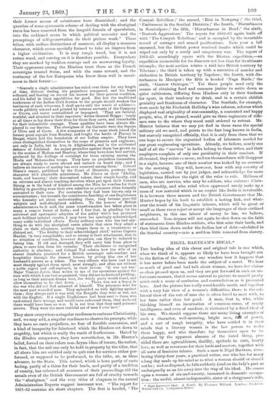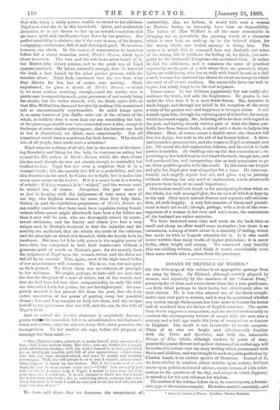NIGEL BARTRAM'S IDEAL.•
THE leading idea of this clever and original tale is one which, when we think of it, appears so likely to have been brought out in the fiction of the day, that one wonders how it happens that it has never before been made the subject of a novel. We hear so much of good and bad talk about woman, we have her claims so often pressed upon us, and they are put forward in such an unfortunate manner, that it seems natural to picture to oneself pretty much such a scene of confusion and contradiction as is presented here. And the picture has really considerable merit, and together with a very fair view of a woman's difficulties, there is the collateral view of the sort of man she is often fated to meet with, to her bane rather than her good. A man, that is, who, while thinking himself an incarnation of common-sense, of manly intelligence, and even of candour, is victimized by a fixed ideal of his own. We should suppose there are many living examples of such a character, well-meaning, bright men, frill of power, and a sort of rough integrity, who have settled it in their minds that a literary woman is the last person to make them happy, and who therefore lay themselves open to be charmed by the apparent absence of the hated thing, provided there are agreeableness, docility, aptitude to earn, hearty love, as well as reverence for their lords and masters, together with all sorts of feminine talents. Such a man is Nigel Bartram, numbering thirty-four years, a practised writer, one who has for many a long day made up his mind as to what a woman should or should not be ; and so disposed, he falls suddenly (and on the lady's part as undesignedly as on his own) into the trap of his ideal. He comes upon a woman of six-and-twenty, immersed in domestic occupation : the useful, almost indispensable, sister of a clergyman's wife,
that wife being a sickly person, unable to attend to her children. Nigel sees what she is in this household. Quiet, and moderately attractive, he is yet drawn to her by an inward conviction that she has a spirit and intelligence kept down by her position. Her perfect amiability is obvious ; she is the very woman of his dreams, —engaging, unobtrusive, full of half-developed good. He receives, however, one shock. In the course of conversation he mentions before her a clever sensation novel, Mark's Dream, which he, is about to review. The host and his wife have never heard of it, but Marion (the sister) colours, and to the quick eye of Nigel appears confused. He infers, naturally enough, that she has read the book, a fact denied by the other parties present, while she remains silent. Nigel feels convinced that she has done what they disown for her, but of course says nothing. Much importuned, he gives a sketch of Mark's Dream, — which is, we must confess, revolting enough,—and the reader, who is pretty sure to suspect the meek, quiet governess of not merely being the reader, but the writer thereof, will, we think, agree with us that Miss Wilford has damaged her plot by making this sensational tale so unquestionably reprehensible. So much hangs upon it, so many sources of just dislike arise out of the scheme of the whole, so unlikely does it seem that any one resembling the lady at the parsonage should ever have concocted such a plot, except in burlesque of some similar extravagance, that the interest one feels in her is diminished, we think, most unnecessarily. Not all sensational novels have a murderess for their heroine. Why should she, of all people, have made such a selection ?
Nigel suspects nothing of all this, but in the course of his ripening friendship and liking for the lady, he ventures on asking her to read his MS. review of Mark's Dream, which she then allows she has read, though she was not sincere enough to contradict her brother-in-law. Nigel has not even a suspicion that it is a woman's book ; this she casually lets fall as a probability, and the idea fructifies in his mind, he thinks she is right, but it makes him much more severe in his review. If it is a man's book it is worthy of rebuke : if it is a woman's it is " wicked," and the woman must be wicked too, of course. Altogether, this part seems to us just in keeping with the judgments of very many men of our day, who frighten women far more than they help them.
Bating in part the injudicious programme of Mark's Dream we can readily conceive that there have been impulsive young female writers whose career might afterwards have been a far loftier one than it ever will be now, who are thoroughly ruined by coarse, sever6 criticisms, and the beauty and charm (we fear a very unique one) in Marion's character is that the injustice and the severity are medicinal, that she admits the truth of the criticism and the principle on which it is founded, while she keenly feels its harshness. But here, let it be told, comes in the mighty power of love—love has conquered in both their hearts—not without a generous spirit of revolt on Marion's part ; for she secretly feels the judgment of Nigel upon the woman-writer, and she dares not risk all by an avowal. This, again, most of the high-toned ladies of our acquaintance will denounce. We do so, too, but not quite on their ground. We think there was no violation of principle in her reticence. We ought, perhaps, to have said ere now that she was the daughter of a man of talent, but of lax morals, and that she had been led into close companionship in early life with one who called forth her genius, but not her higher part. So completely severed is her present life from the past, that she feels entire conviction of her power of putting away her youthful dream ; love and fear conspire to keep her silent, and she resigns herself to the persuasion that she will, and she can, be the wife of Nigel's ideal.
And so indeed she is—the character is exquisitely drawn— genius cant be concealed, but it is subordinated to her husband's tastes and service, only his shrewd sharp little sister perceives the incongruities. To her brother she says, before the proposal of marriage has been made :
" She (Marion) seems, somehow, to make herself what one considers her,—that is the curious thing. Her sister, you see, thinks her a stupid, good, affectionate drudge ; well, she makes herself so to her,—you think her an intelligent, sensible girl, full of nice appreciation; a timid creature who has been misunderstood, and must be gently and tenderly encouraged. Well, she will always be so to you, I suppose, unless something happens to break up the surface. But it does seem as if no one would let her be what nature made her.'—' Child ! how strangely you talk !'—' Do I ? I cannot help it Nigel ; I meant to have seen her with your oyes, but I could not. I do not pretend to know her, but I know she is not what you think ; she is something better, perhaps, but something different.'—'I wish I could be sure you loved her real self, and not your Ow n idea of her.'" authorship; also, we believe, it would with such a woman as Marion, loving so intensely, have been an impossibility. The talent of Miss Wilford is all the more remarkable in bringing out so powerfully the growing worth of a character which is ever bent on making up to the beloved object for the wrong which. one foolish mystery is doing him. The manner in which this is managed does not diminish our sense of the wrong, but it quickens the feeling of, we think, just antipathy to the husband's Teraphim—his enshrined ideal. It makes us feel his selfishness, and it enhances the sense of practical superiority on the part of a wife whose fires are quenched, whose lights are withdrawn, who has to walk with bated breath in a dull round, because her husband has chosen to create an image to which she must at all events conform. She meanwhile loves too well to repine, but vainly longs to be his real helpmate.
Illness comes. In her delirium (apparently but not really) she confesses the truth, and asks his forgiveness. He grants it, but under the idea that it is a mere fever-dream. She, however, is made happy, and through her belief in his reception of the truth a state of far greater ease and happiness is brought about. A call is made upon him, through the extravagance of a brother, for money which he cannot supply. She, believing all to be clear with regard to the past, and having already written part of what she deems perfectly free from former faults, is seized with a desire to help in this dilemma. Here, of course, comes a double error ; she does not tell him her design, but calls in the aid of her former helper. A thousand pounds is promised her, and she comes to Nigel in triumph and joy. Of course the full explanation follows, and the shock to both parties is terrible. Ile dwelling only on the first concealment ; she persisting in her belief that he had heard the truth, though late, and had pardoned her, and interpreting this as tacit permission to go on, when positive good is to be the result. In this crisis our respect and pity for Nigel give way altogether for a time. He contemptuously and angrily rejects her aid, and gives way to jealousy without allowing her any word of explanation, which afterwards proves to have been of no small importance.
Our readers would not thank us for anticipating farther what, on the whole, is a well managed plot, the interest of which is kept up to the end. After much mutual distress and separate self-critninaton, all ends happily. A very fair measure of blame and punishment is dealt out to all ; though, perhaps, with a little of the overeagerness of a woman in her own and sex's cause, the concessions of the husband are rather excessive.
We have bestowed more time and room on the book than so small and cheap an affair would seem to require ; but there is an earnestness, a stamp of truth about it, a sincerity of feeling, which has made us wish to bespeak attention for it. It is also much better written than many works of higher pretension ; it is never feeble, often bright and strong. We commend very heartily this one-shilling volume, and think it worth considerably more than some which take a guinea from the purchaser.



































 Previous page
Previous page